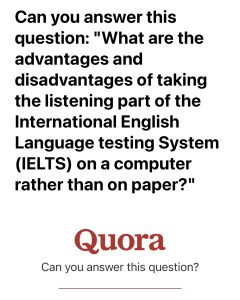This post is also available in:
Español
Dear students and test takers,
Do you need to take the IELTS exam to study abroad or move to the USA or UK? If so, this blog is made for you. When you take IELTS, you will be given two test format options. A computer based exam and a paper based exam.
Understanding the difference between these two formats will impact your test day experience in multiple ways.
We found this question on Quora and thought we would give our readers, not all of whom are parents, some guidance regarding the answer.

We are going to tell you the difference between taking the IELTS paper-based test and IELTS on computer for the listening test. If you are just starting to learn about the IELTS test, let us clarify the exam has four sections which are:
- IELTS Speaking Test
- IELTS Listening
- Reading
- Writing
There are also two versions of this exam, the IELTS academic and general. In addition to this, you can also take a computer based test of paper based IELTS test.
Our business and teachers are experts in the IELTS academic. The difference is not about a computer-delivered test or the IELTS test you read on paper. Instead, the difference is the materials you will see on the exam. Although we focus on the academic exam, we are also well-versed in the general IELTS test.
As the above question is related to IELTS preparation for the listening section, which is the same for both versions of the exam, no matter which test you are taking, this post can help you with the listening section of the IELTS exam.
IELTS on paper vs IELTS on Computer for the listening section
Both the computer test and paper test for IELTS have a common goal: to assess your proficiency in the English language. However, the way you interact with each format and the experience it offers can vary significantly.
Let’s break down what you can expect from each, especially focusing on the listening section.
Similarities in Approaching the Listening for Computer Based vs Paper Based IELTS
The first and most obvious common factor between paper based or computer IELTS for listening sections is that you will go to a test center in the USA or a test centre in the UK for your exam.
See what we did there and why you should follow our blog? As we write, we aim to teach so you can practice reading skills for when you take the IELTS reading section.

Now, back to the remaining similarities between computer based tests and pen and paper IELTS exams.
- Content Consistency: Whether you opt for the paper or computer format, rest assured that the quality and nature of the questions will remain consistent. The IELTS maintains a standard, ensuring fairness for all test-takers.
- Time Allocation: For the listening portion, you’ll get 30 minutes, irrespective of the format you choose.
- Sections and Question Types: The listening section is divided into four sections, moving from social contexts to educational and training contexts. You’ll encounter the same types of questions, such as multiple-choice, matching, map labelling, etc., on both versions.
- Preparation Materials: Generally, the preparation materials you use to study and practice for the listening portion will apply to both the paper based or computer based formats. Skills like understanding main ideas, recognizing specific information, and identifying a speaker’s opinion are universally applicable.
- Trained IELTS Examiner: On both versions of the test, an IELTS examiner will review your tests regardless of whether you take IELTS on computer or choose to test on paper.
Why Should You Choose the Computer-Based IELTS for Listening?
Choosing between the computer-based and paper-based IELTS for the listening section can be a tough decision for many test-takers. If you’re trying to choose between computer or paper but leaning towards the computer-based option, here are some advantages that might reinforce your choice to take the IELTS computer based format.
1. Superior Audio Quality: One of the most significant advantages of the computer based IELTS is the crystal clear audio quality. There’s less room for ambient distractions, ensuring you hear every word distinctly.
2. Adjustable Volume Control: Not everyone has the same listening preference. With the computer-based IELTS, you have the freedom to adjust the volume to a level that’s comfortable for you, ensuring you don’t miss out on any detail.
3. Simplified Answering Process: Forget about the manual transferring of answers. In the computer-based format, you input your answers directly as you listen, making the process smooth and error-free.
4. Digital Interface Familiarity: If you’re someone who’s comfortable with computers, this format will come naturally to you. Navigating through questions and managing time can be more intuitive on a digital interface.
5. Rapid Result Turnaround: Computer-based IELTS often boasts a faster result processing time. If you’re in a hurry to get your scores, this can be a crucial advantage.
6. Auto-Save Feature: Worried about losing your answers? The computer-based test has an auto-save function, so even if there’s a technical glitch, your progress won’t be lost.
7. Neatness and Clarity: Digital answers mean no worries about legible handwriting or messy erasures. Your answers are clear and straightforward.
8. Use of Tools: The IELTS on a computer format often comes with built-in tools like a volume and navigation button. Plus, you can easily skip, review, and change answers without the hassle of erasing and rewriting.
9. Environmentally Friendly: This might not be a primary concern for many, but it’s worth noting. Choosing a computer-delivered test reduces the use of paper, making it a more eco-friendly option.
In essence, the computer-based IELTS listening test offers a modern, user-friendly, and efficient test-taking experience. While both formats have their merits, if the advantages listed above align with your test-taking preferences and strengths, the computer-based option could be the right choice for you.
Also, it’s important to note that most practice tests you will encounter are going to be similar to the IELTS computer based test unless you are practicing IELTS writing, which could require a book or downloadable resources to fill out by writing on paper.
Advantages if you take IELTS on paper for the listening section
While the computer-based IELTS offers modern conveniences, there’s a reason the traditional paper-based format has stood the test of time. For many, the tactile nature and familiarity of paper tests offer a unique set of advantages, especially for the listening section, that using a computer does not:
- Traditional Comfort: For those who have always taken tests on paper throughout their academic careers, the paper-based format can evoke a sense of familiarity and comfort, reducing test-day anxiety. A computer-delivered test can be stress-inducing for those unfamiliar.
- Physical Annotations: This is the largest, most noticeable difference between paper based and computer based IELTS exams. In the former, you can directly scribble notes, underline, or highlight parts of the questions you hear and see. Doing so can aid memory and comprehension for some test-takers. It offers a hands-on approach to information processing, which cannot be done with answers on the computer-delivered IELTS.
- No Technical Glitches: With a paper-based test, there’s zero risk of software crashes or computer malfunctions. Although unlikely to occur, these are always a possibility with any test on a computer. The reliability of the paper is sometimes a major draw for those wary of technology.
- Freedom to Visualize: Many find it easier to mentally map and visualize the flow of information when working on paper rather than taking the test on computer, aiding retention and understanding during the listening section.
- Complete Review Freedom: There’s an ease in flipping back and forth between pages, allowing test-takers to review questions or plan their answering strategy without navigating digital interfaces. Could you imagine reviewing answers on the computer using buttons? Whether taking the exam on paper or on a computer, this is a necessary strategy, making the IELTS test on a computer an illogical choice for some.
- Less Eye Strain: Prolonged exposure to computer screens can lead to eye discomfort for some. Paper tests eliminate this concern entirely; meanwhile, if you take IELTS on a computer, your eyes will feel more strain.
- Direct Engagement: For many, the act of physically writing or shading answers can reinforce memory and comprehension. There’s an element of kinetic learning at play.
- Tactile Learning Advantage: Some individuals retain information better when they engage physically with study material. Writing on paper can trigger this tactile advantage. IELTS pen and paper based answering will help if you are a kinesthetic learner.
- Eco-Concerns Addressed: While the computer-based test is eco-friendly in its way, paper tests, when responsibly sourced and recycled, can also lay claim to being environmentally conscious.
The paper-based IELTS listening test provides an experience that many find grounding and direct. If the points mentioned resonate with your learning style and test-taking strategy, the traditional paper format might be your best bet.
The paper based and computer based IELTS test – in all sections, the choice is yours.
The IELTS, an essential step for many aiming to study or work abroad, offers a flexibility that ensures each test-taker finds a format they’re most comfortable with. Whether you’re deciding between the test on computer and ielts on paper, it’s important to recognize that both formats assess the same skills and hold the same weight in credibility.
The choice primarily hinges on personal preference.
Understanding Both Formats:
- Content Equivalence: Both the paper and computer tests cover the same content across all four sections: Listening, Reading, Writing, and Speaking. The questions, their difficulty level, and the scoring criteria are identical.
- Test Duration: The time allocated for each section remains consistent across both formats. However, the mode of interaction – digital or physical – varies.
- Result Recognition: Universities, employers, and immigration authorities worldwide recognize both formats equally. The choice of format won’t influence how institutions view your scores.
Making Your Choice:
- Consider Your Comfort: Reflect on your past experiences. If you’ve always been comfortable with computers and prefer a digital interface, the computer-based test might be more suitable. On the other hand, if the tactile experience of paper and pen resonates with you, then the traditional format is your go-to.
- Accessibility & Locations: Some test centers might offer one format over the other. Ensure that your preferred format is available at your chosen test center on your desired test date.
- Result Turnaround Time: If you’re pressed for time and need your results quickly, the computer-based test generally offers faster results.
- Special Needs: The IELTS ensures that all test-takers are accommodated. If you have special requirements, check which format caters better to your needs.
IELTS Preparation: Take IELTS Online Tutoring Courses With Expert Guidance
We pride ourselves on offering comprehensive IELTS instruction tailored specifically for those pursuing the academic version of the IELTS examination.
If you’re looking for a personalized approach to preparing for the IELTS exam, our private tutoring sessions might be an ideal choice for you. With certified Cambridge tutors ready to guide you every step of the way, you can learn the nuances of the IELTS exam and work on areas that specifically challenge you.
Our tutors, adept at understanding individual learning curves, will provide specialized guidance tailored to your unique needs. For a deep dive into your IELTS preparation journey, consider booking a private consultation with us.
Self-study with IELTS Computer based lessons
Recognizing the diverse learning preferences of our students, we’re in the process of creating a robust set of pre-recorded IELTS courses. This program will empower you to pace your learning journey on your terms.
With access to video modules, engaging writing tasks, and in-depth techniques and strategies, you can gear up to tackle the IELTS with confidence and achieve a high band level.
If this mode of preparation piques your interest, we invite you to stay in the loop. Register your email using the form below, and we’ll ensure you’re the first to know once our self-study program goes live.
Imagine achieving a band score of 8.5 on your IELTS exam. That’s not just a dream—it was a reality for one of our students.
She’s the perfect example of what’s possible with the right guidance and dedication. After taking her exam, she increased her income by nearly £10,000 per year by getting her dream job working at the NHS in the UK.
I have been having English classes with teacher Sean since the lockdown started back in March 2020. In the last ten months, I have improved my language skills dramatically. My main concern was to rise from a band score of 6.5 to 7 in the written part of the IELTS test. Nevertheless, thanks to the advanced grammar lessons, I was able to reach a band score 8.5. Furthermore, the lessons have improved my listening and speaking skills which are essential to my work, where I need to be fluent in the language. The ability to communicate effectively and deliver my message with clarity has allowed me to be more confident, boosted my self-esteem, and helped me engage better in both my personal and professional life. I would recommend having classes with teacher Sean to anyone who is trying to become better at English. You will not be disappointed.
Don’t you deserve that level of success, too?
Book an IELTS consultation today, or join our email list for exclusive discounts on our upcoming recorded courses.

